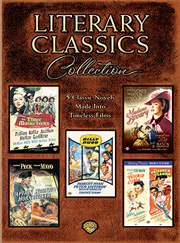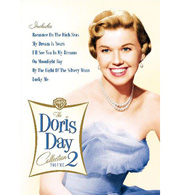What Makes a Movie Gay?
From the blond Alexander, to the blonde Doris, to an obscure Jean Genet short made for Paris porn collectors.
By Jack Varsi
From time to time when I’ve had the opportunity to comment on new DVD releases for this publication, it has been suggested that I consider the readership and skew my words accordingly–that is, find some sort of gay angle in regard to the products at hand. This is fairly easy if I’m commenting on, say, Hollywood Go-Go Boys in Action, and probably easier still if I’m carrying on rapturously about, say, Audrey Hepburn in The Nun’s Story, but a bit problematic when I have to search for gay significance in, say, a Robert Mitchum “Signature Collection.”
 So what have I got to work with for this issue? Well, I have before me volume two of a Doris Day Collection as well as a new Literary Classics Collection, plus Oliver Stone’s latest incarnation of his apparent personal obsession, Alexander, and a two-disc limited edition of a rarely seen 1950 Jean Genet film. Let’s just say two out of four ain’t bad. …
So what have I got to work with for this issue? Well, I have before me volume two of a Doris Day Collection as well as a new Literary Classics Collection, plus Oliver Stone’s latest incarnation of his apparent personal obsession, Alexander, and a two-disc limited edition of a rarely seen 1950 Jean Genet film. Let’s just say two out of four ain’t bad. …
Let me begin with Stone’s new Alexande . You may recall that the much-anticipated theatrical release, which starred Colin Farrell as a sort of “Texas Blond” Alexander the Great, was a box-office disaster in 2004. The subsequent DVD releases included both the theatrical version and a second version of the film, a senseless “directors cut” that was shorter by eight minutes and minus some of the film’s controversial bisexuality.
 Now, believe it or not, we have a third version, this one entitled Alexander Revisited: The Final Cut. (I can hardly wait for Alexander: The Brunette Edition.) This new one is longer by about 40 minutes, is far more intense (well, gory), and presents an even gayer Alexander if you can figure out what’s going on with this version’s altered chronology. Seriously, the new one really is much more entertaining than the previous two, possibly because Farrell’s great butt scene is moved up to about an hour earlier in the picture. …
Now, believe it or not, we have a third version, this one entitled Alexander Revisited: The Final Cut. (I can hardly wait for Alexander: The Brunette Edition.) This new one is longer by about 40 minutes, is far more intense (well, gory), and presents an even gayer Alexander if you can figure out what’s going on with this version’s altered chronology. Seriously, the new one really is much more entertaining than the previous two, possibly because Farrell’s great butt scene is moved up to about an hour earlier in the picture. …
That brings me, for no logical reason, to Warner’s new Literary Classics Collection, which contains film versions of Herman Melville’s Billy Budd (1962), C.S. Forester’s Captain Horatio Hornblower (1951), Gustave Flaubert’s Madame Bovary (the 1949 Jennifer Jones version), Alexandre Dumas’ The Three Musketeers (the campy 1948 Gene Kelly/Lana Turner version), and, maybe best of all, a double-feature of the 1937 and 1952 versions of Anthony Hope’s swashbuckler The Prisoner of Zenda.
Personally, I was most anxious to see Billy Budd, since the film is mentioned in Vito Russo’s The Celluloid Closet and is thereby certified as having some kind of gay content. Alas, being completely unfamiliar with the Melville source material, I couldn’t find much gayness in this shipboard evil vs. innocence tale. But did I really think all those rough sailors were going to gangbang the gorgeously angelic young Terence Stamp, making his film debut here? Well, one can hope. …
 Then there’s this new Doris Day Collection, which is culled from her early years at Warners, beginning with her 1948 film debut in Romance on the High Seas, and including 1949’s My Dream Is Yours (a personal fave), 1951’s On Moonlight Bay, 1952’s I’ll See You in My Dreams, 1953’s By the Light of the Silvery Moon, and 1954’s Lucky Me. Since you’re not going to find much hardcore gay sex in Day’s early films, you’ll just have to settle for her considerable screen charm and her gorgeous voice, plus the contributions of such character actresses as Eve Arden, Mary Wickes, Nancy Walker, and, of course, Rosemary DeCamp. This set really is a feast for classic movie fans. …
Then there’s this new Doris Day Collection, which is culled from her early years at Warners, beginning with her 1948 film debut in Romance on the High Seas, and including 1949’s My Dream Is Yours (a personal fave), 1951’s On Moonlight Bay, 1952’s I’ll See You in My Dreams, 1953’s By the Light of the Silvery Moon, and 1954’s Lucky Me. Since you’re not going to find much hardcore gay sex in Day’s early films, you’ll just have to settle for her considerable screen charm and her gorgeous voice, plus the contributions of such character actresses as Eve Arden, Mary Wickes, Nancy Walker, and, of course, Rosemary DeCamp. This set really is a feast for classic movie fans. …
Finally, what can one say about Un Chant D’Amour, the long suppressed “semi-pornographic” film by Jean Genet made in 1950 for gay Parisian porn collectors? Well, I guess I just said it. Let me just add that this 25-minute film is completely silent, beautifully photographed, and as downright homoerotic as anything you’ve ever seen. It’s set mostly in a prison where some very hunky men are desperate to get at one another while being spied upon by a horny prison guard. You get full nudity, some explicit “autoeroticism,” and a commentary by Kenneth Anger. As Julie Andrews says, these are a few of my favorite things. A second disc offers a 1981 documentary on Genet plus a 1982 interview, but you should probably just linger over the first disc a while and then return to the Doris Day collection to get your senses back. Un Chant D’Amour from Cult Epics (www.cultepics.com); all others from Warner Home Video (www.warnervideo.com). — Review: Jack Varsi











Comments